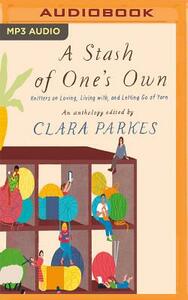Take a photo of a barcode or cover
101 reviews for:
A Stash of One's Own: Knitters on Loving, Living With, and Letting Go of Yarn
Clara Parkes
101 reviews for:
A Stash of One's Own: Knitters on Loving, Living With, and Letting Go of Yarn
Clara Parkes
inspiring
lighthearted
reflective
medium-paced
Graphic: Cancer, Child death, Death, Terminal illness, Death of parent
Minor: Cursing
inspiring
reflective
slow-paced
As is often the case with an anthology, the essays in this book were a bit of a mixed bag -- many were quite predictable (though still enjoyable), and a couple really missed the mark for me, but I found more than a few quite touching indeed. For that reason, of course, particular essays are likely to appeal, or not, to particular readers; my personal favorites were those written by Stephanie Pearl-McPhee and Franklin Habit.
Many knitters feel some amount of guilt about their stash (whether in whole or in part). We feel the need to apologize for it, or explain it away, or hide it completely. The reasons may feel different for each of us, but I suspect that the final essay in the book, written by Debbie Stoller, hits pretty close to the mark if you dig down beneath the surface-- most knitters are women, and thus the fiber arts are a "feminine" pursuit (even, and perhaps especially, for those men who choose to pursue it), and we are socialized into viewing our hobby as kooky or overly indulgent or superfluous, are guilt-ridden, are convinced that there are better things we could and should be doing with our time and money, happiness be damned -- because pleasure (not to mention self-care), in and of itself, is not reason enough.
I found myself a little jealous of all of the stories of mothers and grandmothers passing down stashes and knitterly knowledge down to their descendants (lovely though they were to read). I am a self-taught knitter, and over ten years on, knitting remains a largely lonely, solo pursuit for me, though I wish it weren't so (my own failing, surely).
I appreciated the acknowledgment that minimalism assumes a certain level of economic privilege, and that it romanticizes poverty.
Having finished the book and taken some time to mull things over, I find that the arguments and opinions laid out in this book bring to mind the present fiber-arts-blogosphere conversation about slow fashion -- itself a concept that assumes a certain level of privilege, even as we seek to reduce our involvement in unhealthy systems built upon horrific labor conditions and environmental practices (we could not do so if we did not have the money, not to mention leisure time, to devote to it). In short, even with regards to those essays that found me narrowing my eyes and shaking my head, I was left with something to think about -- not to mention the many laughs and a few misty eyes from those pieces that particularly spoke to me.
* * *
Received a free finished copy from the Abrams Books as part of a giveaway.
Many knitters feel some amount of guilt about their stash (whether in whole or in part). We feel the need to apologize for it, or explain it away, or hide it completely. The reasons may feel different for each of us, but I suspect that the final essay in the book, written by Debbie Stoller, hits pretty close to the mark if you dig down beneath the surface-- most knitters are women, and thus the fiber arts are a "feminine" pursuit (even, and perhaps especially, for those men who choose to pursue it), and we are socialized into viewing our hobby as kooky or overly indulgent or superfluous, are guilt-ridden, are convinced that there are better things we could and should be doing with our time and money, happiness be damned -- because pleasure (not to mention self-care), in and of itself, is not reason enough.
I found myself a little jealous of all of the stories of mothers and grandmothers passing down stashes and knitterly knowledge down to their descendants (lovely though they were to read). I am a self-taught knitter, and over ten years on, knitting remains a largely lonely, solo pursuit for me, though I wish it weren't so (my own failing, surely).
I appreciated the acknowledgment that minimalism assumes a certain level of economic privilege, and that it romanticizes poverty.
Having finished the book and taken some time to mull things over, I find that the arguments and opinions laid out in this book bring to mind the present fiber-arts-blogosphere conversation about slow fashion -- itself a concept that assumes a certain level of privilege, even as we seek to reduce our involvement in unhealthy systems built upon horrific labor conditions and environmental practices (we could not do so if we did not have the money, not to mention leisure time, to devote to it). In short, even with regards to those essays that found me narrowing my eyes and shaking my head, I was left with something to think about -- not to mention the many laughs and a few misty eyes from those pieces that particularly spoke to me.
* * *
Received a free finished copy from the Abrams Books as part of a giveaway.
lighthearted
reflective
relaxing
fast-paced
Fun read! Usually essay collections on a topic have a few essays that feel only loosely tied to the topic. These are all written by people who truly love yarn - and that's exactly what I wanted.
emotional
hopeful
lighthearted
fast-paced
A book of essays on stashes, written by knitters mostly from a knitting/fiber arts perspective. They range the gamut from one about stats on stashes from Ravelry to personal stories of love and loss that affect what yarns people have kept or not kept. There is some social commentary in here, including a beautiful piece about how one woman realized her stash reflected her feelings on her non-typical body, and another from a male knit designer about wanting to use his mother's craft supplies as a child and being punished for it. I also particularly appreciated the one about modern minimalism, which is beginning to be a signal of affluence, because you don't have to keep things if you can always buy more later - which is more elitist than I had realized until relatively recently.
This was a lovely, quiet, relaxing book that I enjoyed, both the banal and the interesting essays, and it was well worth the time spent reading it. If you like fiber arts, this is likely a good read for you too.
This was a lovely, quiet, relaxing book that I enjoyed, both the banal and the interesting essays, and it was well worth the time spent reading it. If you like fiber arts, this is likely a good read for you too.
It's beautiful to see how much the simple idea of stashes can vary between each crafter.
Some of these were as dippy as the marketing for the book suggests. Some were thoughtful reflections on creativity, inspiration, self-worth, and/or memory. Some were basically ads for the author's brand.
It's not really necessary to read the whole book, but there is some good content.
It's not really necessary to read the whole book, but there is some good content.
Quaint collection of short stories from knitters/crafters and their stash.








